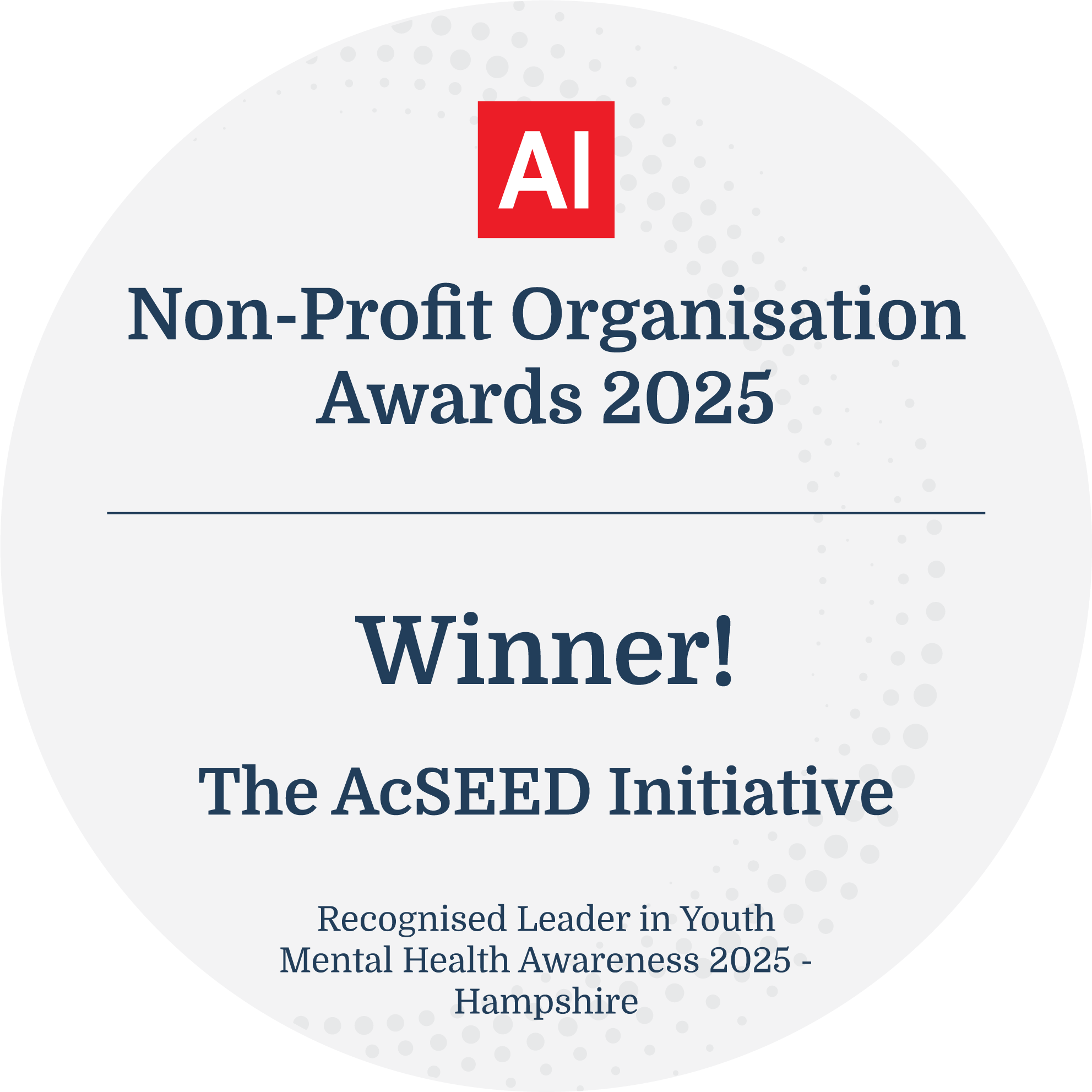Monday 23rd February 2026
Subscribe to the
AcSEED mailing list
This is how we share information and good practices relating to mental health and wellbeing support in schools and colleges
What's New
 The AcSEED Newsletter
The AcSEED Newsletter
29th September 2025
AcSEED Newsletter for September 2025
 AcSEED Youth MH Award
AcSEED Youth MH Award
18th July 2025
AcSEED receives Recognised Leader in Youth Mental Health Awareness 2025 Award from Acquisition International.
 Michael Syddall Accreditation
Michael Syddall Accreditation
14th May 2024
Michael Syddall CofE (Aided) Primary School in Richmond, North Yorkshire receive AcSEED Award
 Sherborne House Accreditation
Sherborne House Accreditation
16th January 2024
Sherborne House School in Chandlers Ford, Hampshire receive AcSEED Award

The AcSEED Newsletter
September 2025
In This Issue
- Editorial
The AcSEED wellbeing framework is as relevant today as when it was founded in 2012. - Peer Mentoring
Focus on the AcSEED criteria of Peer Mentoring, but specifically on the value to those acting as Mentors. - Funding of Mental Health and Wellbeing in Schools and Colleges
Today there is a high reliance on funding of charities to deliver services in schools, but is this adequate and sustainable? - Youth Mental Health Award
AcSEED recognised as leader in Youth Mental Health Awareness. - Sharing of Good Practice
Ideas and suggestions on implementing Mental Health and Wellbeing support in schools and colleges. - AcSEED Accreditations Gallery
Recognising schools and colleges that have recently been awarded with AcSEED accreditation.
Editorial
With the start of each academic year comes a new cohort of young people carrying a mixture of emotions that may include excitement, anxiety, and in some cases even trepidation. Transitions are always challenging for young people, and none more so than those involving a new school, new environment, new class mates, and new staff. This helps remind us of the importance to support the mental health and wellbeing of ALL pupils and students throughout their years in education. The AcSEED wellbeing framework embeds a tiered approach to Mental Health and Wellbeing support - promoting positive mental health to all pupils and students, early intervention to catch concerns before they become a crisis, and access to dedicated professional support if and when needed.
The AcSEED Initiative was setup in 2012 by young people with lived experience of wellbeing challenges during their years in education. Their aim was to ensure that consistent and high quality mental health and wellbeing support was available to ALL young people in ALL UK schools and colleges. They regarded the consistency of support provisions as a key requirement, and this is ensured through use of the AcSEED wellbeing framework - a standard set of criteria defining WHAT wellbeing support needs to be provided, but allowing tailoring of how wellbeing provisions are implemented to suit the specific needs and environment of each school and college.
I continue to be impressed by how robust the AcSEED wellbeing framework has been over the years. Other than some early adjustments for improved clarity, the core criteria are as relevant today as they were more than 10 years ago. During that time society has become much more comfortable with discussing issues around mental health and wellbeing, and the topic is more frequently addressed in the news. Two of the feature articles below relate to recent news items that illustrate this openness, and we discuss their relationship to AcSEED.
The continuing value and relevance of the AcSEED Mental Health and Wellbeing framework also reminds me of the value that is gained by listening to the voice of young people as it was their insight that guided the content of the framework that we still use today.
Nick Gatherer, AcSEED Chief Executive
Features
Peer Mentoring - What's in it for the Mentor?
The AcSEED framework embodies a whole school approach to mental health and wellbeing support, including a range of mechanisms through which pupils and students can seek and receive support. Given that some young people find it easier to talk to their peers than to adults, the value of peer mentoring schemes is widely recognised.
A recent BBC News article highlighted a scheme in which anxious teenagers were given the opportunity to mentor toddlers at a local nursery school. The scheme is run by the Power2 charity, and aims to improve a teenagers school attendance by building their confidence and self-esteem. Given that school absence has almost doubled since the pandemic, this seems an important topic to address. Power2 say that 78% of young people on the scheme improve their attitude to learning, and 83% of them have improved their self esteem. One 13-year-old participant said that "coming here has taught me more about how to communicate and be more confident and it's funny a toddler is teaching us things" - her attendance has more than doubled as a result of participating in the scheme.
Whilst this scheme has a specific and targeted cohort of participants, it does highlight a benefit of peer mentoring schemes that often gets overlooked - the benefits that accrue from preforming the role of a peer mentor. These benefits can include:
- Personal growth and increased knowledge
- Improved communication skills
- Greater sense of empathy
- A sense of purpose and responsibility
- A sense of accomplishment and achievement
- Improved self-confidence and self-esteem
- Opportunity for self reflection
- Recognition
The AcSEED wellbeing framework includes a mandatory requirement for schools and colleges to support peer mentoring. Whilst the specific type and implementation of mentoring schemes will need to take factors such as their purpose and target age groups into consideration, AcSEED does expect all peer mentoring schemes to include an appropriate level of structured training and on-going support to be provided to mentors.
Where a school or college caters exclusively for young people with special needs, the implementation of a peer mentoring scheme may prove to be more challenging. Despite this AcSEED believes it is still useful in these circumstances to consider whether a peer mentoring scheme could add value (considering the benefits both to mentors and mentees), but appreciates that the conclusion might be that such schemes are impractical.
Article: Meet the three-year-olds helping anxious teens spend more time in school
Funding Mental Health and Wellbeing in Schools
A primary school in Windsor was recently in the news asking for more government funding for mental health support in schools. The school already has some wellbeing support provisions in place including resilience workshops and weekly dog therapy sessions thanks to funding from a local charity. However the vital importance of wellbeing support, particularly in early years to prevent (or at least minimise the probability of) future mental health issues, leads the school to identify the need for more government funding in this area. And more specifically they highlight that this vital support should not be dependent on charity funding.
AcSEED provides an independent wellbeing framework that encourages a whole school approach to mental health and wellbeing support, whilst also emphasising the importance of charities and health organisations across the country to provide specific services help schools and colleges fulfil the AcSEED criteria. One of the key aims of AcSEED is to ensure that wellbeing support is not 'here today and gone tomorrow', ie to ensure that the wellbeing ethos and provisions are tightly integrated into the policies and procedures of schools and colleges.
Unfortunately there is always a risk that the funding of charities and government programs can change at any time, and when money is tight mental health and wellbeing programs could be seen as an opportunity for cost savings. This is why the AcSEED wellbeing framework has been defined as an independent standard, describing WHAT wellbeing provisions need to be provided. HOW those requirements are met can be tailored by the school or college according to their individual circumstances, but also based on the funding and support services available to them which might change over time. This on-going maintenance of wellbeing provisions is why AcSEED accreditation is reviewed every 3 years.
Most schools and colleges will of course fully understand the potential value of increased government funding for Mental Health and Wellbeing support, a good example being the current roll-out of Mental Health Support Teams (MHSTs). According to NHS England, as of Spring 2025 over 600 MHSTs are now operational and accessible to 52% of the pupil and learner population in over 10,000 education settings. MHSTs should be a great additional resource for schools and colleges to utilise, and will be able to help deliver or facilitate a good number of the mandatory AcSEED wellbeing criteria.
AcSEED Receives Youth Mental Health Award

We are pleased to announce that Acquisition International has presented the following award to The AcSEED Initiative as part of their Non-Profit Organisation Awards 2025:
Recognised Leader in Youth Mental Health Awareness 2025 - Hampshire
This is a fantastic recognition for the dedicated work of our AcSEED Volunteers, and affirms the value of the Mental Health and Wellbeing support being provided by AcSEED accredited schools and colleges.
Sharing of Good Practices
One of the key aims of AcSEED is to help share good practices on Mental Health and Wellbeing support across UK schools and colleges. The following ideas and suggestions have all been described within AcSEED
applications and/or evidence, or directly communicated by schools and colleges.
If your school or college has something that would be useful to share with others (a wellbeing provision or process that has worked well, or even something that didn't work as expected) then please let us know so we can share it through the AcSEED Newsletter and webpages.
We are very happy to attribute the idea to a school or college, or can publish anonymously if preferred.
Colour-coded Lanyards
Idea or Suggestion
Colour-coded lanyards can be used to identify staff with specific wellbeing roles or skills. This can help pupils and students to more easily identify staff members whom they can approach for support.
In some cases the scheme has been extended to help identify peer mentors or wellbeing ambassadors.
What We Like About It
This is a simple and easy-to-understand mechanism that can add significant value at a very low cost. It is already being used in numerous schools, and will require very limited effort for other schools and colleges to adopt.
Online Worry Box
Idea or Suggestion
An online implementation of a worry box available for students if they don’t feel they are able to talk about their concern face to face.
What We Like About It
An online version of a familiar concept, which also avoids the potential stigma of placing personal concerns into a physical worry box.
As with all forms of worry box it is important for pupils and students to know that their concerns will be treated confidentially, but there
also needs to be a mechanism to illustrate that concerns are being reviewed and addressed.
The ease of implementing such a system will likely
depend on the web infrastructure already in place and whether this allows for confidential communications to be made.
AcSEED Accreditations Gallery
Sherborne House School receive AcSEED Award

Congratulations to Sherborne House School in Chandlers Ford, Hampshire who have been accredited with The AcSEED Award.
“The AcSEED assessment team were particularly impressed by the strong wellbeing ethos at Sherborne House School, by their comprehensive range of mental health and wellbeing provisions supporting both pupils and staff, and by their close collaboration with external wellbeing organisations and with parents” said Charlotte Gatherer, founder of The AcSEED Initiative. We are therefore delighted to announce that Sherborne House School has been accredited with The AcSEED Award”.
Pictured are Cordelia Crips (Headteacher), Nick Gatherer (Chief Executive, The AcSEED Initiative), Pam Holmes (Head of PSHE), and Jacqui Carter (Assistant Head Pastoral Lead and SENCO).
Michael Syddall Church of England (Aided) Primary School receive AcSEED Award

Congratulations to Michael Syddall Church of England (Aided) Primary School in Richmond, North Yorkshire who have been accredited with The AcSEED Award.
Pictured receiving the award are the school Wellbeing Champions.
To submit an article or letter for publication in The AcSEED Newsletter, or to request further information on the content of this newsletter or The AcSEED Initiative, please email us at: contact@acseed.org





